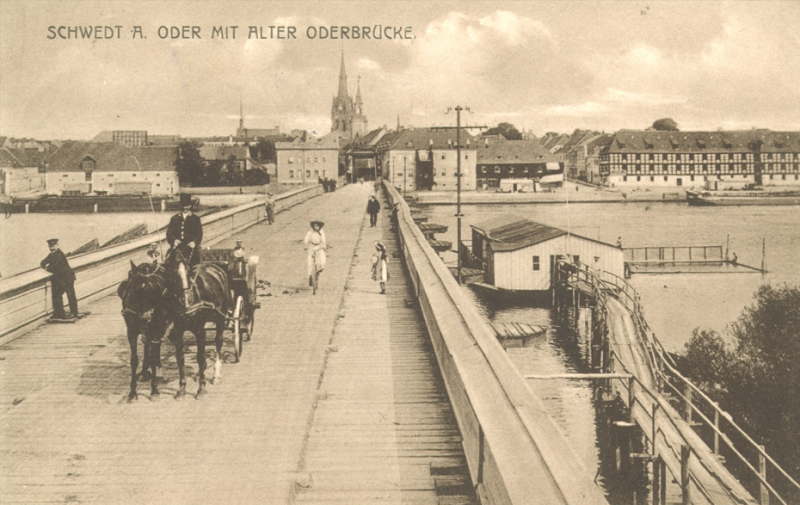Town history

The oldest document that refers to Schwedt as a town dates back to the year of 1265. The location at the only Oder crossing between Stettin and Oderberg and protection by the Pomeranian administration fostered the settlement of traders, craftsmen and farmers.
For centuries knights and mercenaries passed through the Uckermark, and the ownership of several places and parts of the region changed hands between Brandenburg and Pomerania. Only at the end of the 15th century did Schwedt finally come to Brandenburg.
During the Thirty Years´ War Schwedt was devastated and pillaged by passing war combatants several times: the plague, too, claimed numerous deaths. On October 19, 1637, the town was nearly completely destroyed. In 1625 Schwedt had about 1,500 inhabitants, but twenty years later this number amounted to only 280. It was only after decades, that the pre-war level was reached again.
In 1670, Electress Dorothy, second wife of Elector Frederic William, purchased the Schwedt/Vierraden dominion as a seat for their eldest son Philipp William. The resolute and intelligent electress replaced numerous feudal arrangements with montary payments for the citizens of Schwedt and thus promoted the economic development of the town.
The settlement of Huguenots after 1685 positively affected the economy, too. Among other things they brought the cultivation of tobacco into the Uckermark and made Schwedt a centre of tobacco trade and processing. The margraves of Brandenburg-Schwedt, descendants of the Great Elector, converted Schwedt into a baroque residency. Nearly all of the city´s important monuments originate from that period of history. Additionally, several fires were conducive to a establishing a new town layout with a grid-like road network.
In 1788 the Schwedt margravate ceased to exist and the castle came under the private ownership of the Hohenzollern dynasty.
During the following 150 years economic life in Schwedt was determined mainly by the production of tobacco. About one third of the population – having grown to 10,000 people by the end of the 19th century – cultivated tobacco or worked in one of the numerous small tobacco and cigar factories.
Above all, the last margrave, Frederic Henry, gave the residency the brightness of a cultural town. Notable actors and musicians of that time worked at his court theatre. Whereas at other courts Italian and French operas still determined the repertoire, German musical comedies and dramas were performed at the operetta theatre.
In April 1945, a few days before the end of the Second World War, Schwedt was nearly completely destroyed. More than 80% of all housing fell victim to the severe artillery fire. The border regulation by the Allies effected a completely new situation. The Neumark region and Stettin, important for regional trade, now belonged to the Republic of Poland. History of the town
The town only recovered slowly from its war wounds. The building of a paper factory in 1959 (now LEIPA Georg Leinfelder GmbH) and the crude oil processing plant in 1960, which later became "Das Petrolchemische Kombinat Schwedt" (now "Die PCK Raffinerie GmbH"), were decisive factors in Schwedt's post war development. Labour from all over the DDR moved to the town and their families followed. New developments with utilities, schools and nurseries shot up. By 1989 Schwedt had a population of about 52,500.
Like everywhere in the new German states (the former states of East Germany) the years following German reunification brought great change and upheaval in people's lives. A succession of businesses and institutions had to close. Even the tobacco industry which had deep roots in Schwedt could not be saved. By stimulating and stabilising its potential Schwedt/Oder is one of those towns which have emerged from this process with new vitality. In a changed environment it has been possible to preserve and develop the two industrial mainstays of the town – crude oil and paper processing.

